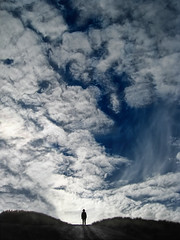
Don't Tell Me The Sky Is The Limit, There Are Footprints On The Moon!
Originally uploaded by Peter from Wellington
Last Sunday we watched a group of Lakota children receive baptism, confirmation and first communion thereby becoming full members or "communicants" in the Roman Catholic Church. I was raised Catholic and I have studied a fair bit of theology, so I understood a lot of the symbols and beliefs of these religious acts the RC.s call 'sacraments'. I know from experience the emotional power these rituals can have, and I know from experience how utterly empty they can feel. Theoogically speaking, the feelings are unimportant, but we are what we are and feelings always matter. One of the recipients of all three sacraments was a high school student I work with and with whom I have a reasonably honest relationship. When I first met her she was adamant in declaring her faith as 'Native religion'. When I talked to her about her decision to be baptized Catholic, she told me frankly that she was only doing it for her grandmother. For a 14 year old, that is not the worst reason in the world to do this; it is an act of love and respect. But it is not what she would have chosen for herself at this time in her life. She is a bright and reflective person and I can't help but wonder if she will pursue any spiritual path when she is able to choose for herself. I hope she will find a way to pursue her people's faith and practices in the Lakota traditions but I have no way to help her with this, and I find that frustrating. I know her family loves her deeply, and I know they respect the old ways, so perhaps she will find the path, the "good red road".
Still, how much more meaningful would it be for her, and for the other children, to be nurtured in the ancient faith of their people, the Lakota; to be given her rite of passage as a Lakota girl into womanhood, the Ishna TA Awi Cha Lowan. How much more worthwhile as a part of the people would the the boys feel if they were able to do the Hanblecheyapi, the crying for a vision?
In all fairness, the mass included an honor song performed in Lakota by a drum group from the school. The drum is sacred and the incorporation of this into the Catholic service was a mark of respect which the priest shows in all the ways he can. He incorporates Lakota into the mass by saying the ancient Christian prayer, "Lord Have Mercy, Christ Have Mercy" in Lakota. His vestments were adorned with the Morning Star on the back and the medicine circle complete with the sacred colors on the front of his chasuble. And he is a man who seems to genuinely love and respect the Lakota children he serves. Certainly the children show love and respect for him. It is about as good a situation of this sort as one could hope for, short of a priest who was Indian, fluent in the language and raised in the native culture on the rez. But that aint likely. And that is the crux of my quandary, if this is actually important to the People, where are the Lakota nuns, priests and bishops? You can find Lakota holy men and women around. A couple of the girls claim to have grandpas and uncles who are Lakota 'medicine men'(the term they use). But the people of the First Nations do not seek religious orders. Of course this is the plight of the Catholic Church in America. They are unable to fill the needs for priests and other religious leaders, so perhaps this is not a question of the faith failing to be meaningful so much as it is failing to make the celibate religious life, divorced from family and community meaningful.
I believe that a person's spritual path is one of, if not the most important aspect of human life. I wish I could see these children have the chance to be led in ways that truly belong to them, and in which they would find true belonging.



No comments:
Post a Comment